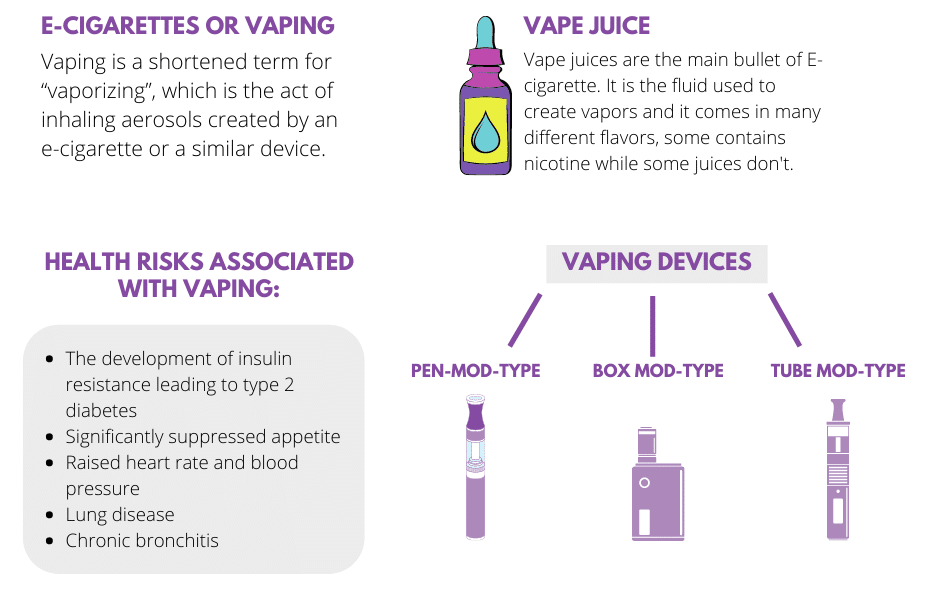As a parent, trying to protect your child from experimenting with dangerous substances is extremely difficult. This applies especially in today’s society, where it seems as if each year there is a new dangerous trend. Recently, teen vaping has become a common trend. In fact, research has shown that nearly 37% of high school seniors reported vaping within the past 12 months.
While vaping and using e-cigarettes may not appear as harmful as other substances that teens experiment with, it actually causes significant damage and may lead to the development of an addiction. In order to shed light on the severity of teen vaping, the U.S. Surgeon General has declared the use of e-cigarettes among American teens as an epidemic. As a result, it is vital for parents to come together to take action and prevent teenagers from being subjected to the health effects of vaping. In order to do so, parents must become knowledgable on vaping.

Table of Contents
ToggleFacts on Vaping
What is “Vaping”?
Vaping is a shortened term for “vaporizing”, which is the act of inhaling aerosols created by an e-cigarette or a similar device. Many people believe that vaping is safe because they think they are only inhaling water vapor. However, e-cigarettes contain an array of harmful chemicals that health professionals do not know much about yet. In fact, e-cigarettes and other vaping devices were not introduced until 2007 as a “safer” alternative to cigarettes. Consequently, we have not seen enough evidence of the effect that these chemicals have on people’s bodies long-term to know the actual risks.
What Do Vaping Devices Look Like?
In order to know if your child is vaping, you must know what vaping devices look like. There is a wide range of different vaping devices out there, each one differing in shape, size, and color. Teenagers who vape are most likely to use smaller vaping devices because they are easily concealed. Therefore, teens typically have vaping devices that are the shape and size of a pen or USB drive.
While pen-style vapes are common among teenagers, “box-mod” vaping devices are also increasingly popular among the vaping community. “Box-mod” vapes are usually about the size of your fist, and unironically, are shaped like a small box. While these are more difficult to conceal, many people prefer this form of vape because they offer bigger hits of vapor.
Common Substances that Teens Vape
While most adults use vaping devices in order to quit smoking cigarettes, teens typically pick up vaping in order to have fun or appear “cool”. Additionally, teenagers may be unaware of the harm they are inflicting on themselves.
According to the National Institute on Drug Abuse, 66% of teens say that their vaping devices contain just “flavored liquid”. While this may be less harmful than vaping nicotine or marijuana, the chemicals used to create flavored vape juices are just as harmful. Additionally, this study found that 13% of teens say they vape nicotine and 5.8% reported that they vape marijuana. Even more disturbing, 13.7% of teens reported not knowing what was in the vape juice that they vaped. Therefore, these statistics prove that teenagers have little to no idea what substances they are vaping and what kind of health effects they could begin to experience.
Risks of Teen Nicotine Use
Nicotine is a dangerous substance for people of any age group. However, children and teens who have not fully developed yet experience greater risks than adults. Additionally, many people (especially teenagers) assume that vaping nicotine is safer than smoking it.
Unfortunately, there are several health risks associated with vaping:
- The development of insulin resistance leading to type 2 diabetes
- Significantly suppressed appetite
- Raised heart rate and blood pressure
- Lung disease
- Chronic bronchitis
As an adolescent or young adult, vaping nicotine can severely impair the development of the prefrontal cortex. This part of the brain is responsible for planning, attention focus, and impulse control. Because of the severe effects that vaping has on this part of the brain, children and adolescents can develop an addiction to nicotine faster than adults.
Oftentimes, teens do not know how to identify if they have an addiction to vaping nicotine. In order to tell if you are addicted to nicotine, ask yourself these questions:
- Have you ever tried to quit, but couldn’t?
- Have you ever felt like you were addicted to vaping?
- Do you experience strong cravings to vape?
- Is it hard to keep from vaping in places that you are not allowed to?
- Have you ever had trouble concentrating because you were unable to vape?
- Do you feel irritable when you can’t vape?
- Do you ever feel nervous, restless, or anxious when you don’t vape?
If you or your child answered yes to any or all of these questions, they are experiencing an addiction to vaping nicotine. Children and teens typically experience nicotine dependency symptoms after only one month of vaping.
Signs of Teen Vaping
Because teens typically use small devices in order to conceal their vaping habits, it can be difficult to tell if your child is vaping. However, there are symptoms of vaping that you can spot if you pay close attention.
If you think your teen is vaping, you should be aware of these signs and symptoms:
- An unusual sweet smell, typically a fruity smell
- Bloodshot eyes
- Becoming increasingly irritable
- Having nosebleeds
- Being thirstier than usual
- Becoming more sensitive to caffeine
- Coughing persistently
If you notice one or more of these signs, it is likely that your teen is vaping nicotine. In order to prevent serious health complications, you should begin to open a conversation with your child about the risks of vaping. Having a conversation of this sort with your child is never easy, but early intervention could prevent addiction as well as other severe health risks.







